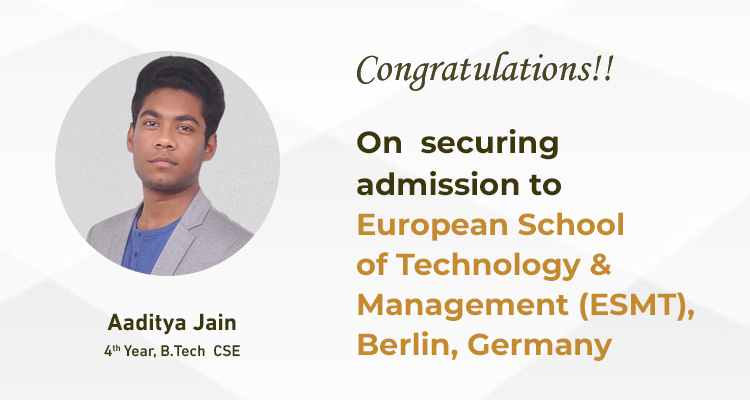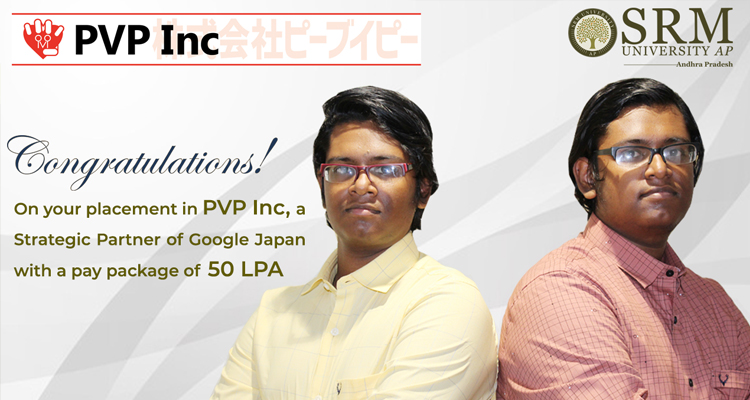Recent News
- No.1 Business School in Germany admits Aaditya Jain from CSE June 25, 2021
 Here’s an exclusive interview with Aaditya Jain, a Computer Science Engineering graduate from SRM University-AP who has secured admission in ESMT Berlin, Germany.
Here’s an exclusive interview with Aaditya Jain, a Computer Science Engineering graduate from SRM University-AP who has secured admission in ESMT Berlin, Germany.Q. Hi Aaditya, please tell us about yourself.
I am Aaditya Jain, a Computer Science Engineering graduate of Batch 2021 at SRM University-AP. I have always been fascinated by Business and Management and the impact that technology can bring about in transforming them. I have led AIESEC in Amaravati for 2 years and have done various internships in the field of Business & Management.Q. Can you tell us your motivation behind applying to ESMT?
ESMT is a triple-accredited Business School, No.1 in Germany and No. 8 in Europe and No. 26 in the world (for its programme) according to ‘The Economist’, ‘Bloomberg Business’ and ‘Financial Times’- major ranking firms for the Business Schools. ESMT Berlin – European School of Management and Technology GmbH is located at the heart of Berlin, Germany. It is a business school founded by 25 multinational corporations including BCG, McKinsey, BMW, Allianz and others. I also applied to NOVA business school in Portugal, UCD Smurfit in Ireland and a few others.Q. Can you talk about the course that you have enrolled in?
I would be pursuing a Master’s in Management (MBA) specialising in Global & Digital Strategy at ESMT Berlin, Germany. This is a 2-year programme with integrated Internships and Social Impact Projects launching my career into the field of Management Consulting/Marketing.Q. Are you offered any scholarships there?
Yes, I am offered ‘Outstanding Student Leader’ scholarship of Euro 5500 by ESMT.Q. How was your preparation for these university applications?
I always knew that I wanted a career in Management and Business. Right from my freshman year, I worked towards it. I started and led AIESEC in Amaravati (something highly valued by Business Schools), and I also did internships in the field of Marketing & Strategy. I made sure I get a pro-bono internship experience abroad and for that, I did an internship in Greece, Athens. I wrote my GMAT and at the same time, focused on my Essays. I think it’s all about being honest and genuine with yourself and others that count in the end.Q. Can you elaborate on the support you received from SRM University-AP?
My university has immensely helped me in terms of both professional growth and financial assistance. I am grateful to SRM University-AP for providing me with sponsorship to attend my Master’s in these times of Covid-19 when everything is very uncertain. I am really thankful to Dr Srabani Basu who has helped me all throughout the 4 years of my journey at SRM AP. She mentored me, taught me business communication and interview skills, helped me develop my lateral thinking.Q. What are your dreams about the future?
Continue reading →
I want to work around the world, experience new cultures and be a pioneer in Digital and Strategic Transformation making sure the sustainable development of organisations. I also want to make sure that I impactfully and positively represent SRM University-AP wherever I go. - First private university to achieve twin foreign placement in maiden batch June 24, 2021
 The prodigious twins of SRM University-AP proved their mettle again, cracking job offers with the highest salary of the season. Rajarshi and Saptarshi Mazumder from the Department of Computer Science and Engineering have been offered the positions of Technical Engineers-IT at PVP Inc Japan, a strategic partner of Google, Japan, with a pay package of 50 LPA. SRM University-AP becomes the first private university in India to achieve twin foreign placement in the maiden batch
The prodigious twins of SRM University-AP proved their mettle again, cracking job offers with the highest salary of the season. Rajarshi and Saptarshi Mazumder from the Department of Computer Science and Engineering have been offered the positions of Technical Engineers-IT at PVP Inc Japan, a strategic partner of Google, Japan, with a pay package of 50 LPA. SRM University-AP becomes the first private university in India to achieve twin foreign placement in the maiden batchComing from a small town in West Bengal, the twins joined SRM University-AP with dreams in their eyes. They struggled with their schooling due to the transferable nature of their father’s job, but it also prepared them with the mindset to overcome any obstacle that comes in their way to excellence. Rajarshi and Saptarshi found their educational abode in SRM University-AP, where their dreams and ideas were encouraged and nurtured.
“Every moment at SRM-AP was so defining. Academics and research, 24×7 student-run Next Tech Lab, Semester Abroad and Entrepreneurship at UC Berkeley, USA and winning Hackathon in Bay area competing with MIT, Stanford and Carnegie Mellon gave us the wide exposure of the real world, which would not have been possible without the continuous support of our faculty and university management. Now, it is time that we start our life in Japan, and we are very much looking forward to the new chapter,” said Rajarshi.
SRM University-AP is proud of its first graduating batch with a 100% Placement record, with most students getting multiple offers from reputed companies. 71% of students got Marquee, Super Dream, and Dream offers of ₹20+, ₹ 10+ and ₹ 5+ lakhs, respectively; and 600+ companies visited the university for recruitment. Top recruiters include Amazon, PayPal, Barclay, American Express, Bank America, Walmart, AB InBev, TCS, Cognizant, Infosys, L&T, AIS, JSW and Adani. The students of the Department of Computer Science and Engineering have bagged an attractive average salary of 8 LPA.
“SRM University-AP is founded with the vision to offer quality engineers, entrepreneurs and professionals to the country. In the Maiden Placement Drive itself, our graduates have shown predominance making the university a favourable destination for top industrial recruiters,” said Prof V S Rao, Vice-Chancellor, SRM University-AP.
Prof Ragunathan, Associate Dean in the School of Engineering and Sciences and Head of the Department of Computer Science and Engineering shared that our university has acquired the brand name as a prominent tech hub to the recruiters searching for the choicest engineers. “We are certain that in the coming years, the number of recruiters visiting will further increase, creating a record in the country”, he added.
Mr Vivekanandan, Assistant Director, Corporate Relations and Career Services, said that the department always looks for the best opportunities for the students. The aptitude of CSE students manifested in their internships, projects, curricular and extra-curricular endeavours naturally drew the attention of best recruiters to SRM University-AP.
Continue reading →

